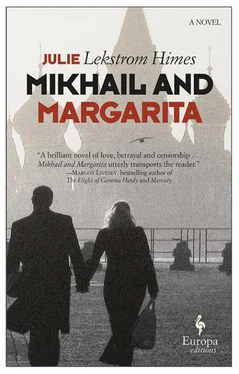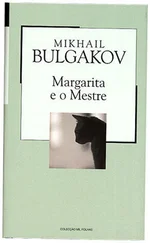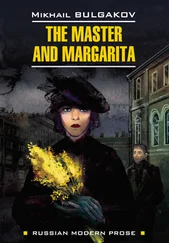Bulgakov searched their last moments together at the camp; nothing she had said or done would support this, yet other images slipped willfully past these thoughts. He imagined Ilya and Margarita standing alone in the foyer of a comfortably furnished house; the light was low; perhaps they had been guests of some future happy evening, well-fed, the conversation and laughter of the gathering still clinging to them as they prepared to depart into the snowy night. Ilya offered her coat, holding it as she slipped it on; then, with practiced intimacy, lifting her hair so that it might spill over the collar. She turned and Bulgakov saw her ease, her grateful smile, as she buttoned it close. Ilya layered upon it her scarf; sometimes he wrapped it about her neck; this time instead he leaned in and kissed her lightly. She waited while he put on his coat; she looked to the window; her face held only patient waiting. Beyond her, the light from the street shone in halos through the glass. The threads of her scarf were frayed slightly and brushed the edge of her cheek. Her eyes glistened. Perhaps she was thinking of the quiet walk home.
Pyotrovich took him outside to a small enclosed yard; a collection of women of varying ages and ethnicities had been arranged to stand along a wall. The local police had been conducting regular sweeps of the train depot, he explained; his gesture was both effeminate and dismissive. Likewise in Ulan-Ude and Chita. Pyotrovich went down the line; it seemed more of a schoolyard inspection and he appeared unexpectedly pleased, as though these women were somehow a favorable reflection upon himself. He stopped before one; he removed his glove and stroked her cheek. She was young and sturdily built.
“Feel this complexion,” he gushed. “That brow, that cheekbone.” He drew his thumb along these. He then squeezed her shoulder. “She could plow a field single-handed.”
Her gaze was stony. He pinched her cheek then slapped it. She didn’t flinch and he laughed at this. “Any one of them,” he swept his arm. He glanced at Bulgakov as though suggesting he might pick one for himself. They might both pick.
“We’ll get them,” he said. Bulgakov should not despair.
Bulgakov looked at the women—did any even resemble her? And if one had, would he have risen up in her defense? To save a nose of a similar tilt, a common complexion, hair that was styled in the same fashion? The women looked cold, the breeze moved across their coats; they looked frightened. He wanted to save them all, a triumph of her cause.
She must leave with Ilya. Both needed to disappear. He imagined them together in the train depot; anxiously looking to the timetables, listening for the approaching whistle. Would their hands be clasped? In mutual comfort or something more? How could she not love someone willing to sacrifice for her? For Ilya, this had never been a choice. What if he could warn them, ensure their escape? Would he not try? Was this even a choice?
What could Pyotrovich know of despair?
Bulgakov went to the train depot.
The interior was an open space with rows of benches. The wall adjacent to the ticket sellers had been painted black; the arrivals and departures were posted in chalk. The next train was due in several hours and the benches were half filled. Margarita and Ilya weren’t there.
Ilya would anticipate the police surveillance of these stations. This one would be as good as any.
Bulgakov sat down.
Nearby a young soldier waited next to a woman who appeared to be his mother. Between them on the floor was a single suitcase tied with string like a parcel. His uniform was new; its cuffs were stiff and without wear. His hands, pale young things, rested on the fresh fabric of his trousers. He looked regularly to the board and to the windows overlooking the platform. Squares of blue promise. His face carried both uncertainty and excitement.
His mother looked away from the ticket windows, away from the chalkboard, from the platform, and instead to the doors which led to the town, to the street where they’d lived their years together. Bulgakov could only guess—perhaps seventeen or eighteen. She would know. She would try to recall some memory from when he was small and still needed her. She would wish she could talk to her own mother about it.
One of the conductors came with a cloth, and, climbing the short stepladder, updated the board with fresh chalk.
Their soldier was a good boy. He tried to look regretful of the approaching hour; she tried to seem brave.
He would get on the train; he would wave farewell and later would forget this day; others would take its place.
She would remember the walk home; she would notice not the other pedestrians, but instead their footprints in the snow and the way light shifted to blue as it passed into the shadow cast by the fragile rim. She would climb the stairs to the apartment they’d shared, a tidy room in the fading light, a lamp-shade made of colored glass, a figurine from another country, and she would wonder how any of these things could have ever held importance to her before.
Bulgakov looked about the depot—others, scattered figures lost to their own thoughts. Their hearts were available to him for his reading; the particulars of their defeats as though they’d been pinned to their coats like a written notice. Here was the real People’s Army. He would be a willing recruit. He would come back tomorrow, and each day of those that followed. He would do what was necessary to safeguard her departure. He would join their ranks.
The next morning they did not start a fire. Ilya brought out clothes suitable for a young man and Margarita dressed quickly. Her breasts were camouflaged by the loose tunic. He handed her a cap. “Wouldn’t it be better to cut it?” she said. She twisted her hair atop her head and put it on. He stepped back to examine her. He shook his head.
“This isn’t going to work,” he said. He took some ash from the fireplace and smeared it lightly over her chin. “It’s hopeless,” he said, in a kind of wonderment.
She looked at her reflection in the small mirror of his shaving case. She couldn’t capture the entirety of her head in it.
“I can try to scowl like a teenager,” she said.
He studied her; he seemed contemplative of something else.
“Perhaps you should cut it,” she said after a moment. She removed the cap.
He looked away as though her gesture had unsettled him. “If I thought it would help, I would,” he said. He went to manage the luggage. She put the cap back on.
Her other clothes and papers were placed in the hidden compartment of the suitcase. The new papers he produced made her his nephew.
Outside, the air was still. Fresh snow covered the ground and settled on the larger branches. The sky was pale with thin high clouds. The sun, hanging low in the east, was a tepid yellow ball. She got into the car with him. Today, he told her, they would leave Russia forever.
He smiled; they were nearly there.
He started the car. She touched the back of her neck where the chilled air had slipped past the collar of her coat.
They stopped along the roadside briefly. In the distance a town clung to shallow-sloped hills. It was cold and bright with a steady breeze. Ilya had brought some food and she spread a cloth across the hood of the car and laid out the small meal. He set a flask of vodka where their cup would have stood. She took a drink and he smiled at this. It felt like a dare and she drank again.
“When I become too drunk to walk,” she said. “What will you do with me?”
“I will carry you home,” he said.
His use of the word surprised her. She imagined a flat they might share, the cluttered messiness: stacks of books, dishes, shoes about the floor. Both his and hers. Did he make the bed or allow the sheets to collect in a mound at the foot? Would he measure first before hanging a picture or tack it askew? It seemed disconcerting that she didn’t know such things.
Читать дальше












